The Tanzanian Mkulima Kwanza is a natural processed peaberry we source via Bespoke.
Tanzania
Tanzania has many famous African landmarks. To the north-west is Africa’s biggest lake, Lake Victoria (or Nyanza). And to the north is Africa’s tallest peak Mount Kilimanjaro. Surrounded by the Indian Ocean to the East. Northern borders are Kenya and Uganda. And to the West are Rwanda, Burundi, The Democratic Republic of Congo. While to the South are Zambia, Malawi and Mozambique.
Tanzania has a long history with South Africa too. During apartheid, many ANC exiles lived in the country running the revolution from Tanzania since the country was far away and close enough at the same time.
Tanzania coffee
The pre-colonial history is an oral one. The Haya people are said to have bought with them an amwani or Haya Coffee. Probably this was a Robusta variety. Ripe cherries are boiled then smoked for several days. Following this, they are enjoyed by chewing. Today this ritual is firmly entwined in Tanzanian culture1.
Under German colonial rule, Arabica trees were planted throughout the Bukoba region. In some areas, there was resistance to replace the food producing crops with coffee. The first tribe to adopt coffee production on a large scale was the Chagga. Based around Mount Kilimanjaro, they became the leaders in growing Arabica in Tanzania.
The Kilimanjaro Native Planters’ Association (KNPA) is believed to have been the first cooperative. Cooperatives are the way most of the coffee business works in Tanzania. While there are a small number of large estates, to this day almost all Tanzanian coffee is grown by smallholders. Selling their cherry to the cooperative, who then process, package and export the coffees. Reforms in the 1990s allowed a more direct sales model from producers to buyers, by-passing the State Coffee Marketing Board.
In numbers
Coffee is a significant contributor to Tanzania’s economy and is its largest export.
Today (2015) just under 50,000 smallholder farmers that produce 90% of Tanzania’s coffee, the remainder is produced by large estates. In short of all the coffee produced, 70% of Tanzania’s coffee production is Arabica, while the rest (near the Ugandan border mainly) is Robusta. Production 2013: 750,000 bags (60kg).
See a map of coffee zones in Tanzania.
Tanzanian Mkulima Kwanza
As mentioned above, we sourced this coffee via Bespoke. 2019 was the first year of Bespoke working with the Kwanza co-operative. Kwanza is based in the Southern Highlands region of Tanzania. Bespoke first met Keremba Warioba (founder and CEO of Communal Communal Shamba). Keremba was not producing coffee at the time. Specifically, he had travelled to visit some coffee producers in Burundi that Bespoke had worked with before. Keremba was in Burundi to get a deeper understanding their processing methods. It was fortunate that Keremba was staying in the same guest house as the members of the Bespoke team. Team members got on well with Keremba. His vision for his home town in Tanzanian they found enticing. So a relationship formed that resulted in the Bespoke keeping in touch.
Organic Growth
Over the last two years, Communal Shamba has grown from producing 1200kgs in 2017, to 30,000kgs in 2018. Despite a significant change in the structure of how coffee is traded at the national level (see direct trade mention above). The co-operative growth is a testament to Keremba’s belief in his vision and ability to organise in a community he is familiar with.
This station only produces Natural coffees. Since the area has a water scarcity, the natural process is a good fit. However, this method does require more considerable attention to detail. Keremba’s organisational ability has driven the quality of the process, which is evident in the cleanliness of cup. Added to this is an impressive thick body coffee. Taste notes include cherry and stone fruit flavours, while still retaining the classic syrup sweetness of a well processed natural coffee.
Details of Mkulima Kwanza
| Region: | Mbozi District, Southern Highlands Zone, Tanzania | |||||||||||||
|---|---|---|---|---|---|---|---|---|---|---|---|---|---|---|
| Co-operative: | Mkulima Kwanza co-operative | |||||||||||||
| Farmers: | 189 small-holder farmers | |||||||||||||
| Harvest: | Main crop: December – March (2019). Landed SA May 2019. | |||||||||||||
| Processing: | Natural. Dried on raised African beds, where they are regularly tossed. | |||||||||||||
| Altitude / Latitude: | 1,700 – 1,800 masl / 8.96°S | |||||||||||||
| Packaging: | GrainPro in Hessian | |||||||||||||
| Cultivars: | Arabica Bourbon, Kent | |||||||||||||
| Characteristics: | A four-star complexity coffee, with syrup sweetness and apricot notes. | |||||||||||||
| Roast used: | Intense flame to start, with a gentle decrease to assist decreasing ramp rate, then gentle acceleration into first crack, when flame it dropped totally. Coffee is dumped a minute after first crack. | |||||||||||||
| Our brews: |
|


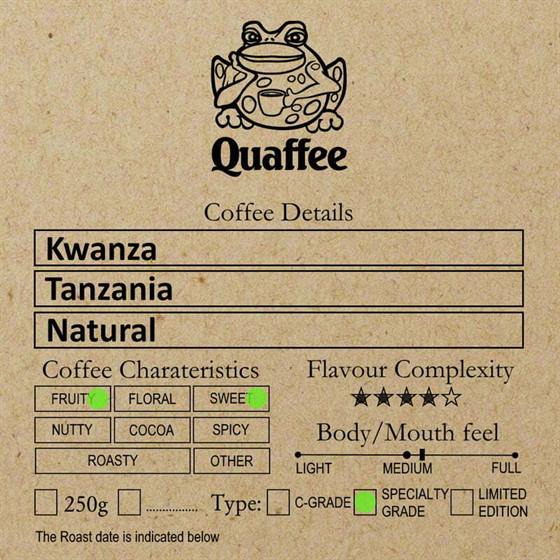
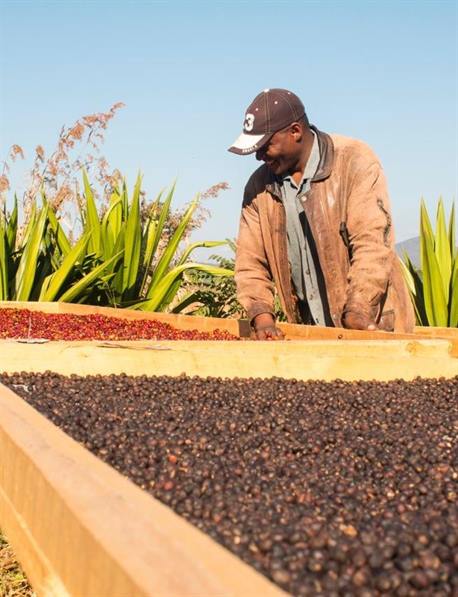
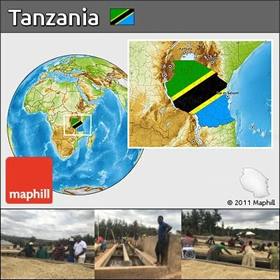
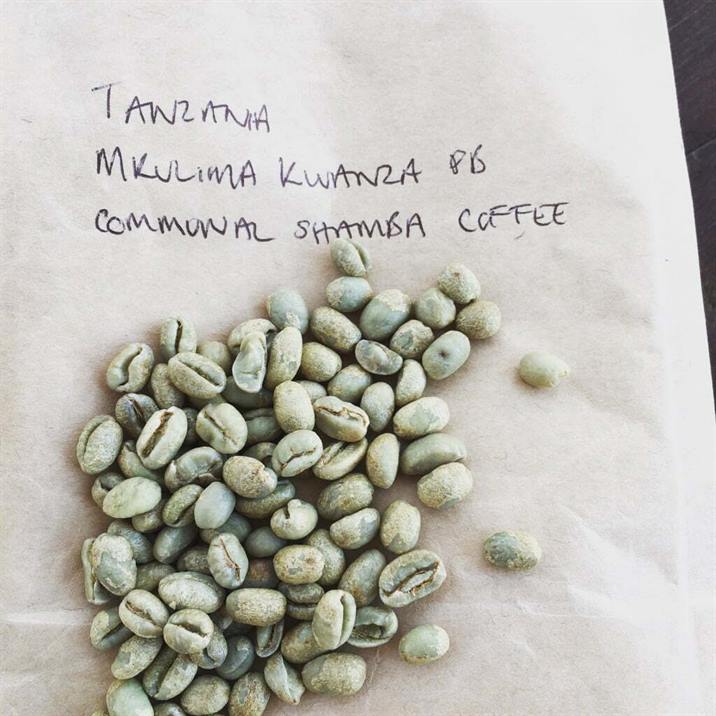
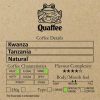
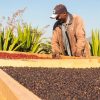
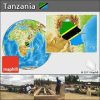
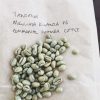


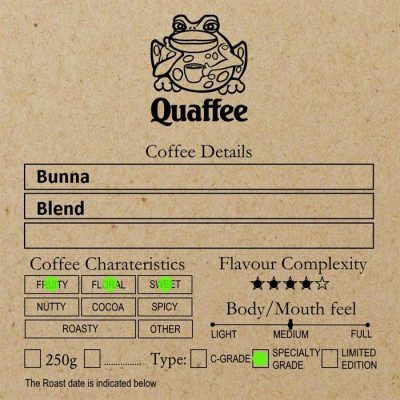
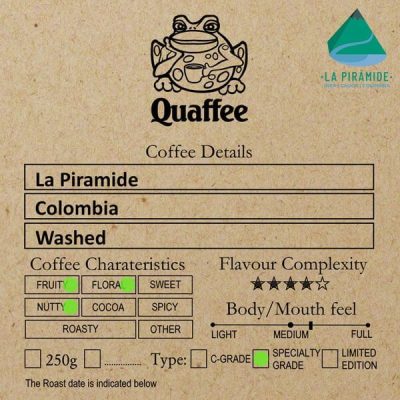
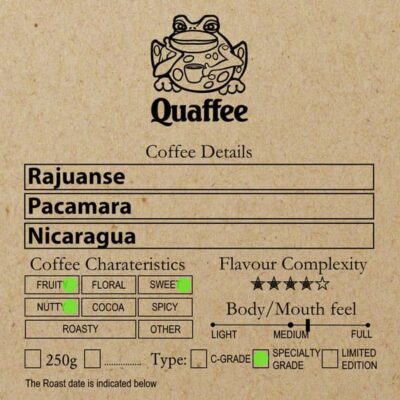
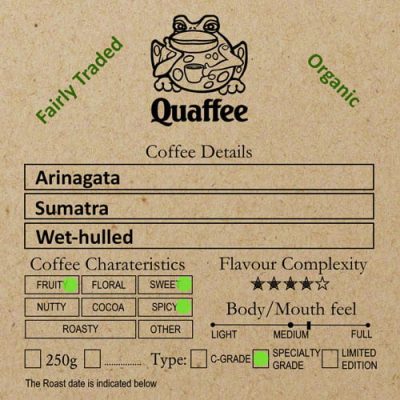
Reviews
There are no reviews yet.